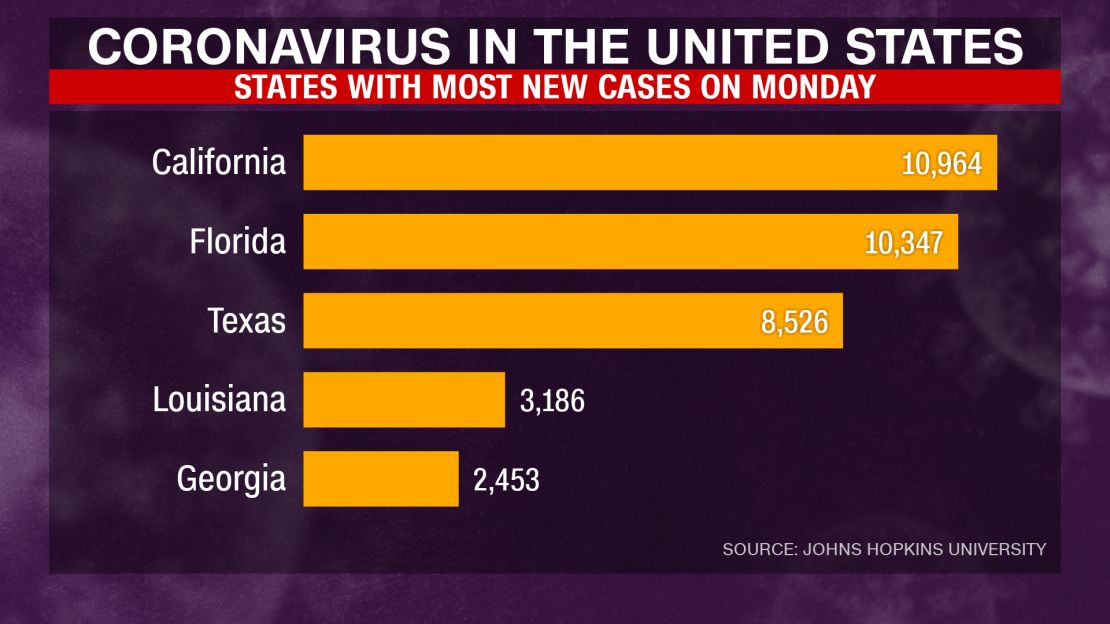More than 150 prominent US medical experts, scientists, teachers, nurses and others have signed a letter urging political leaders to shut down the country and start over to contain the surging coronavirus pandemic.
“The best thing for the nation is not to reopen as quickly as possible, it’s to save as many lives as possible,” they wrote in the document, which was sent Thursday to the Trump administration, leading members of Congress and state governors.
“Right now, we are on a path to lose more than 200,000 American lives by November 1st. Yet, in many states people can drink in bars, get a haircut, eat inside a restaurant, get a tattoo, get a massage, and do myriad other normal, pleasant, but non-essential activities.”
Their recommendations come as the United States crossed the 4 million mark on Thursday, with at least 4,028,741 cases of coronavirus and 144,072 deaths, according to Johns Hopkins University’s count.
Covid-19 “will end up as a Top 10 leading cause of death” this year, statisticians from US Centers for Disease Control and Prevention predicted in a Thursday email to CNN.
Although the CDC cannot start ranking leading causes of deaths until the end of the year – in order to get a full year’s worth of data – agency statisticians at the agency said they expect Covid-19 will end up among the Top 10 leading causes of death in the nation.
Heart disease and cancer are the two leading causes of death in the US, accounting for more than half of all US deaths each year, and the statisticians don’t expect that to change.
Opening the economy safely

The recommendations come as many states are grappling with record numbers of new cases and overloaded hospitals, high unemployment rates and pressure to make decisions for the upcoming school year.
The only way to reopen the economy and the country safely is to follow a set of protocols that public health experts deem necessary for controlling the spread of Covid-19, the letter contends.
They include: enough daily testing to test everyone with flu-like symptoms, a work force of contact tracers large enough to track all current cases and more personal protective equipment to keep essential workers safe.
In addition, they say all non-essential businesses should be closed and restaurants nationwide should only provide takeout service. People should only leave their homes to get food and medicine or fresh air and exercise, and masks should be mandatory in all situations, the letter urged. Leaders should also ban interstate travel to help contain the virus.
“If you don’t take these actions, the consequences will be measured in widespread suffering and death,” the letter warned.
“Our decision makers need to hit the reset button,” said Matt Wellington, the public health campaigns director for the advocacy group U.S. PIRG, which joined with health experts to draft the letter.
“Continuing on the path we’re on now will result in widespread suffering and death. And for what? Health experts laid out criteria for how to reopen safely. It’s time to listen to them,” Wellington said.
The University of Pennsylvania’s Dr. Ezekiel Emanuel, William Hanage with the Harvard T.H. Chan School of Public Health, Northwestern University’s Dr. Seth Trueger and Yale School of Medicine’s Dr. Reshma Ramachandran are among the growing number of experts who have signed the letter.
Many Americans are at risk
About 41% of US adults have at least one underlying medical condition that may put them at a higher risk for severe Covid-19 outcomes, according to a new CDC report published Thursday.
Get CNN Health's weekly newsletter
Sign up here to get The Results Are In with Dr. Sanjay Gupta every Tuesday from the CNN Health team.
The research, published in the agency’s Morbidity and Mortality Weekly report, looked at five conditions that tend to put people at greater risk for more severe disease from the coronavirus: chronic obstructive pulmonary disease (COPD), cardiovascular disease, diabetes, chronic kidney disease and obesity.
It did not include other conditions, such as sickle cell disease or organ transplants.
The numbers of adults with these conditions varied by county – from almost 1 in 4 adults to as many as two-thirds of adults in a county. In half of US counties, almost 1 in 2 adults were estimated to have an underlying condition.





















